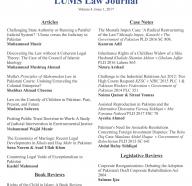
We are pleased to present the fourth volume of the LUMS Law Journal. This Journal aims to provide a platform for legal scholarship in Pakistan by encouraging reflection and research on the most relevant legal issues of the day. Collaboration between scholars, practicing lawyers and students has led to the fruition of Volume 4, which contains seven articles, five case notes, two legislative reviews and one book review.
Dr. Muhammad Munir sheds light on the contentious relationship between ulama and the state law in Pakistan. Dr. Munir analyses the role of the ulama in the Pakistani judicial system by examining the case law related to khul‘ to demonstrate the extent to which ulama can challenge the authority of the state. In his article, Dr. Muhammad Mushtaq Ahmad analyses the methodology of the Council of Islamic Ideology and highlights its failure to develop a comprehensive and internally coherent legal theory. Dr. Shahbaz Ahmad Cheema scrutinizes the context in which Mulla’s Principles of Mahomedan Law was written. His article also examines the way courts in Pakistan have made use of Anglo-Mohammaden laws contained in this book. Lack of comprehensive laws governing child custody in Pakistan often compromise a child’s wellbeing, as Dr. Mudasra Sabreen shows through her evaluation of the Guardians and Wards Act 1890. She reviews the proposed reforms to this issue, against the backdrop of previous legislation and inconsistent case law pertaining to child custody. In his article, Muhammad Wajid Munir introduces the concept of environmental justice. Pakistani judiciary has a crucial role to play in the implementation of the Public Trust Doctrine, which is critically studied through case law and legislative tests. Sana Naeem and Asad Ullah Khan identify the need for progressive, gendered improvements to Islamic family law by probing into the contractual nature of a marriage in Islam, and what the monetization of marital obligations means for women in particular. Restricting its analysis to cases of khul‘, their article discusses the implications of the ‘economics of marriage’. In light of ethnic, sociological and theological tensions in Pakistan, Dr. Kashif Mahmood considers whether Pakistani courts have adopted an approach centered on human rights. The article inspects the attitude of the judiciary during periods of disturbance, and the way it has altered discourse on civil and personal liberties.
In the first case note, Kamran Adil outlines the effects the Mustafa Impex case had on Pakistani judicial landscape. The author discusses impact of the judgment on federal and provincial governments from a legal, political, and sociological point of view. Nimra Arshad’s case note on Khalida Shamim Akhtar v Ghulam Jaffar focuses on the right of inheritance of a widow of a Shia husband under Islamic inheritance law. This case note highlights the role of judiciary in protecting and promoting women’s right to property under Islamic inheritance law. Naima Qamar and Siraat Younas conduct a parallel analysis of KESC v NIRC and Pakistan Workers Federation v Government of Pakistan to explain how the validity of the Industrial Relations Act 2012 was challenged after the 18th Amendment. Ayesha Ahmed’s case note on Farooq Siddiqui v Mst. Farzana Naheed delves into the issue of assisted reproduction in Pakistan. This case note presents a comparative analysis of the stances taken by different Muslim countries and Islamic schools of thought. The last case note, written by Abdul Rafay Siddiqui on Maulana Abdul Haque v Government of Balochistan, assesses the domestic resolution of foreign investment disputes in Pakistan. This case note stresses on the need for Pakistani judiciary to have a grasp over international law in order to avoid international arbitrations.
Salman Ijaz peruses the features of Pakistan’s Draft Corporate Rehabilitation Act 2004 in the legislative review. This reform to corporate legislation attempts to incorporate part of the US Bankruptcy Code in Pakistan. The author analyzes the extent to which this has been possible. Sara Raza traces the difficulties the Hindu community had to face regarding marriage laws in her legislative review of the Hindu Marriage Act 2017. The plight of this minority community is extensively discussed in the context of Pakistan’s history and previous laws on Hindu marriage. Mustafa Khan reviews the book, Rights of the Child in Islam, authored by Dr. Muhammad Munir. This review is appreciative of the delicate and controversial issues that Dr. Munir discusses, and probes into the depth of analysis conducted.
We would like to extend our gratitude to the Chief Editor, Dr. Muhammad Zubair Abbasi, and the Co-Editor, Marva Khan for their guidance and supervision. We are also grateful to our Faulty members, Dr Muhammad Azeem, Dr. Faiza Ismail, and Ms. Rida Jamal; LUMS alumnus, Maham Naweed, Salman Ijaz, and Muhammad Mustafa Mirza for constantly providing constructive feedback and overseeing the work of student editors. We would like to acknowledge the support and encouragement of our Dean, Prof. Dr. Martin Lau, and the Vice Chancellor, Prof. Dr. Syed Sohail Hussain Naqvi.
The publication of Volume 4 of the LLJ was made possible due to the efforts of the members of the LLJ Editorial Committee. We especially thank our sub-editors, Abdul Wahab Niaz, Eesha Arshad Khan, and Sara Raza, for their hard work in reviewing and editing the submissions.
Our aim, as always, remains to encourage scholarship and discourse on Pakistani law, and we always welcome aid in pursuing this endeavor. If you wish to provide us feedback, or make recommendations or suggestions, please write to us at submissions.llj@lums.edu.pk. The Student Editors

